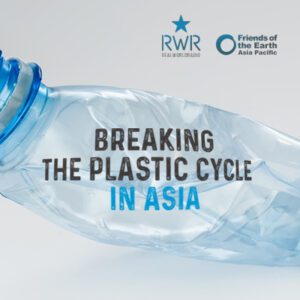Asia is drowning in plastic, with national production and imports from the global north having devastating environmental and public health impacts. According to a report [1] by Friends of the Earth Asia Pacific, most South and East Asian countries lack proper waste management strategies, regulations and facilities to deal with the plastic waste crisis. Often, communities are forced to resort to open dumping and burning of waste, exposing them to harmful toxins. As a result, waterways and farmlands are being contaminated with plastic pollution, putting people, communities, food production and biodiversity at risk.
Yet there is a global movement fighting to break the plastic cycle in Asia and there is an opportunity for change. Countries such as Malaysia, Sri Lanka and Bangladesh have introduced new laws to ban single-use plastic, control waste imports and aim to build a circular economy. However, this is not an easy fight, and it is against multinational companies and cooperates, billionaires and governments.
Ahead of the second session of the Intergovernmental Negotiating Committee (INC2) to develop an international legally binding instrument on plastic pollution, Real World Radio spoke with Friends of the Earth member groups, Centre for Environmental Justice in Sri Lanka [2], Bangladesh Environmental Lawyers Association [3] and Sahabat Alam Malaysia [4] about what progress has been made over the past five years to address plastic pollution in the Asia Pacific, what challenges remain, and how a global plastic treaty could help the plastic crisis in the region.
